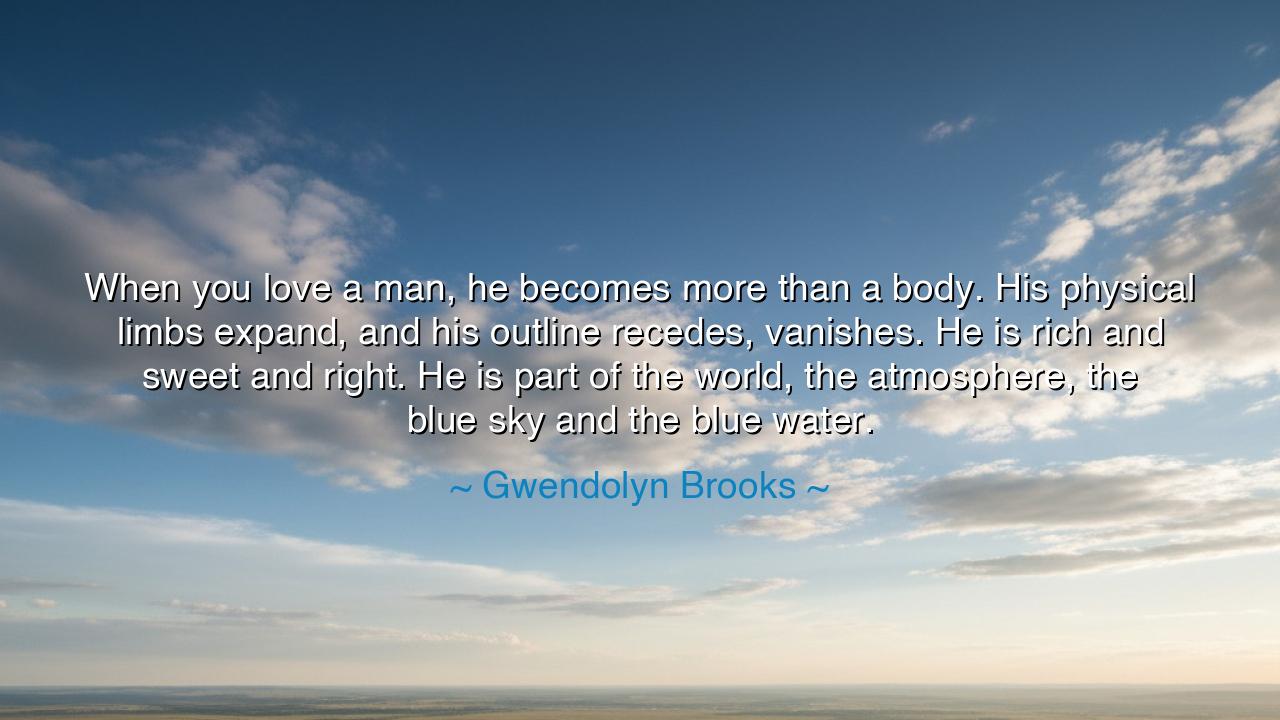
When you love a man, he becomes more than a body. His physical
When you love a man, he becomes more than a body. His physical limbs expand, and his outline recedes, vanishes. He is rich and sweet and right. He is part of the world, the atmosphere, the blue sky and the blue water.






“When you love a man, he becomes more than a body. His physical limbs expand, and his outline recedes, vanishes. He is rich and sweet and right. He is part of the world, the atmosphere, the blue sky and the blue water.” – Gwendolyn Brooks
Thus spoke Gwendolyn Brooks, the poet whose words carried both the fire of truth and the tenderness of the human heart. In this profound reflection, she reveals what the ancients themselves once knew — that love is the most sacred alchemy, the power that transforms flesh into spirit, and the visible into the infinite. When Brooks writes that the beloved “becomes more than a body,” she is speaking of love as transcendence — that rare moment when affection rises beyond the senses, and the soul sees not merely a person, but the very pulse of creation itself reflected in another being.
To love, as Brooks describes, is to dissolve the boundaries between self and world. The body of the beloved — once seen as separate, finite, and mortal — begins to vanish into something greater. His form is no longer confined to skin and bone; he becomes light, breath, essence. This is the moment when true love ceases to possess and begins to revere. The lover no longer says, “He is mine,” but rather, “He is part of everything.” Love, in this higher form, is not an emotion that cages — it is a recognition that the beloved is woven into the tapestry of the divine, “the blue sky and the blue water,” the eternal flow of life.
The origin of this vision lies in Brooks’s own poetic soul — a woman who saw love not merely as passion, but as revelation. Living through the turbulence of 20th-century America, she understood the body as both sacred and impermanent, the vessel of something eternal. Her words echo the mystic poets of old — Plato, who spoke of love as the ladder that leads the soul upward toward beauty itself; Rumi, who saw in the beloved’s eyes the reflection of God; Sappho, who knew that desire was the doorway to divinity. Brooks continues their lineage, reminding us that when love is pure, it dissolves separation — it turns the human form into an element of the universe.
Consider the story of Pierre and Marie Curie, whose partnership of love and science transcended the ordinary. Their love was not born merely of attraction, but of shared vision — a merging of souls in the pursuit of truth. Together, they discovered elements that glowed with unseen energy, a fitting mirror of their own bond. When Marie spoke of Pierre after his death, she did not speak of him as gone; she spoke as though he had become part of the air she breathed, the light she worked by, the essence that moved through her every discovery. So it is with love as Brooks describes — the body vanishes, but the presence remains, fused with the cosmos.
This transformation of the beloved from the physical to the eternal is one of love’s greatest miracles. It teaches that the truest love is not about beauty or desire alone; it is about seeing the infinite within the finite. When one truly loves, the other’s laughter becomes the sound of the world’s joy, their sorrow becomes the grief of the earth, their being becomes the rhythm of life itself. Such love is not blind — it is awakened. It does not end with death, for what has become one with the universe cannot be lost.
Brooks reminds us that love, in its highest form, is a form of enlightenment. It expands the heart until it embraces the world. It teaches us that the divine is not distant — it lives within those we love. When we love deeply, we begin to see life not as a series of separate forms, but as a single, breathing organism in which every soul is connected. The beloved becomes both mirror and messenger, revealing to us that love itself is the language through which the universe speaks.
So, my listener, remember this: do not stop at loving the body — love the being. See through the form into the essence that shines within. Let love teach you to see the sacred in what is ordinary, the infinite in what is near. For when you love in this way, you will find, as Gwendolyn Brooks did, that the one you love ceases to be merely a person — he becomes the horizon itself, the blue sky above you, the waters that sustain you, and the quiet proof that love is the force that binds the stars, the earth, and the soul into one.






AAdministratorAdministrator
Welcome, honored guests. Please leave a comment, we will respond soon